(Disclaimer: This is my personal opinion, not that of any movement or organization.)
This post aims to show that, over the next decade, it is quite likely that most democratic Western countries will become fascist dictatorships - this is not a tail risk, but the most likely overall outcome. Politics is not a typical LessWrong topic, and for good reason:
- it tends to impair clear thinking;
- most well-known political issues are not neglected;
- most political "debates" are simply people yelling at each other online; neither saying anything new, nor even really trying to persuade the opposition.
However, like the COVID pandemic, it seems like this particular trend will be so impactful and so disruptive to ordinary Western life that it will be important to be aware of it, factor it into plans, and try our best to mitigate or work around the effects.
Introduction
First, what is fascism? It's common for every side in a debate to call the other side "fascists" or "Nazis", as we saw during (eg.) the Ukraine War. Lots of things that get called "fascist" online are in fact fairly ordinary, or even harmless. So, to be clear, Wikipedia defines "fascism" as:
a far-right, authoritarian, ultranationalist political ideology and movement, characterized by a dictatorial leader, centralized autocracy, militarism, forcible suppression of opposition, belief in a natural social hierarchy, subordination of individual interests for the perceived good of the nation and race, and strong regimentation of society and the economy
Informally, I might characterize "fascism" as:
a system of government where there are no meaningful elections; the state does not respect civil liberties or property rights; dissidents, political opposition, minorities, and intellectuals are persecuted; and where government has a strong ideology that is nationalist, populist, socially conservative, and hostile to minority groups.
(The last point is what separates fascism from, say, Stalinism. Stalinism is also very bad, but is not a major political force in 2023.) So by "fascism", I specifically mean a radical change in the basic form of government, not simply a state doing dumb things like making immigration hard or banning Bitcoin. Not all fascists are the same - eg. Mussolini's Italy was initially opposed to Nazi-style racism - but their movements, ideology, rhetoric, and leaders tend to share many common characteristics (see also eg. here).
Fascism is very bad, and therefore, it would be really great if it were unlikely to happen in well-established democracies like the US. Unfortunately, as with AI risk, most arguments for that scenario being unlikely tend to resemble this comic from XKCD:
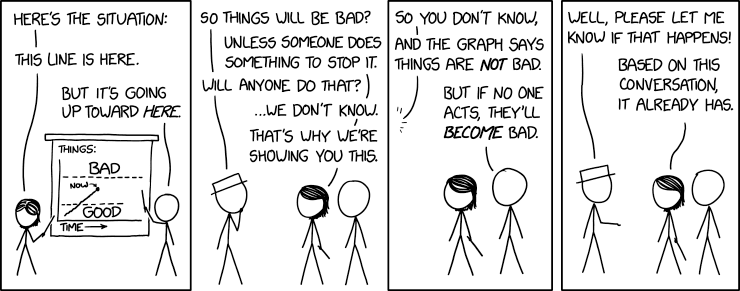
or this comic about AI risk:
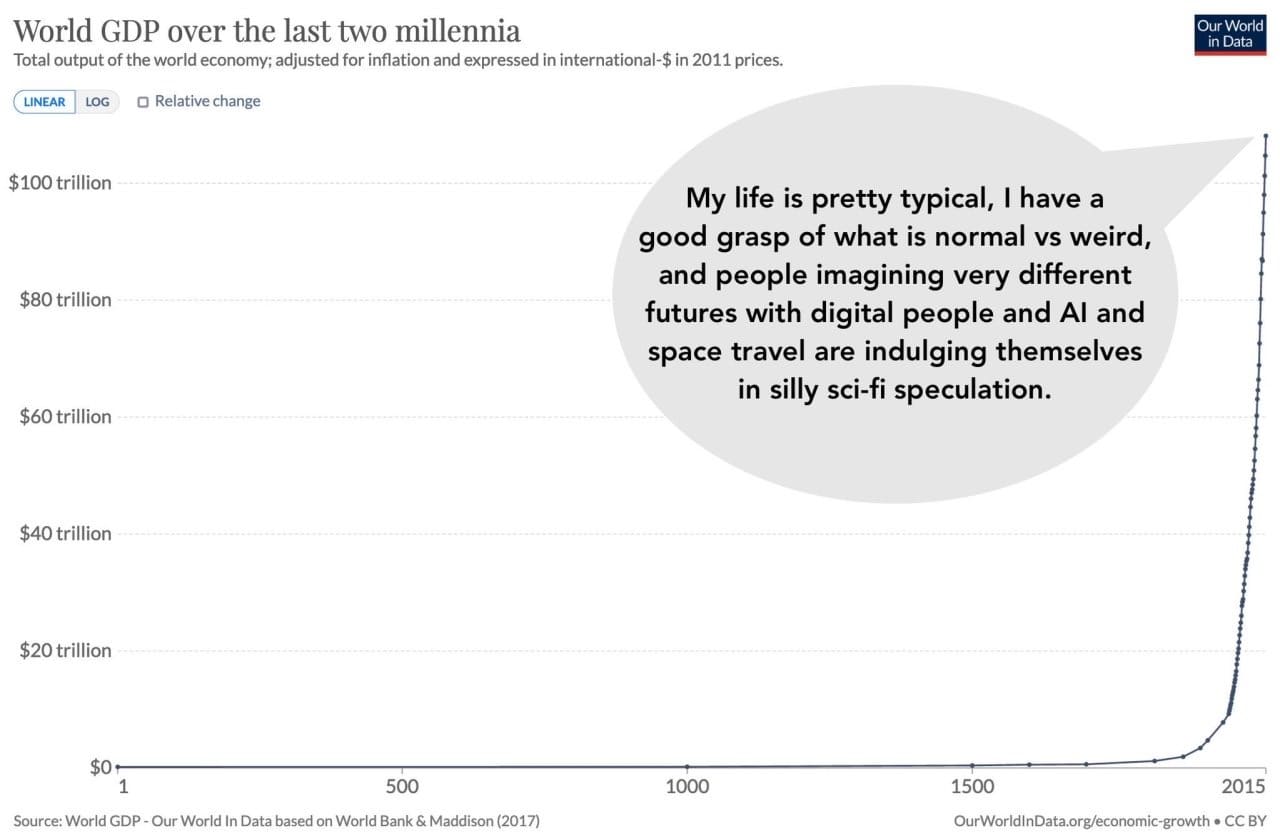
The first argument goes, essentially, that things are basically fine now, and are unlikely to become bad immediately (next week or next month), so therefore we have nothing to worry about. The counterpoint, of course, is that if existing trends continue progressing - and there's no convincing reason why they must stop - the future a few decades from now will become very different from the present. The second argument is that the relevant scenario would be pretty weird by the standards of our current lives (as rich, educated Westerners living in 2023), so we should assume it's unlikely. However, our contemporary lives and civilization are themselves very weird historically (vs. the more typical peasant farming), and there's no fundamental reason why they have to keep on going forever. Indeed, them continuing forever is in some ways a contradiction, since current society relies on economic growth and innovation; we can't coherently forecast "everything stays the same, including the derivatives".
Present Trends
What do the derivatives look like, in terms of countries going fascist? Concepts like "fascism" and "democracy" are tricky to measure, and there are many different standards one could use. However, essentially all the widely used metrics now show a global decline in democracy, and a rapid growth in right-wing authoritarianism and illiberalism, which is sometimes called the "third wave of autocratization". Here is Freedom House's graph of "democracy under siege":
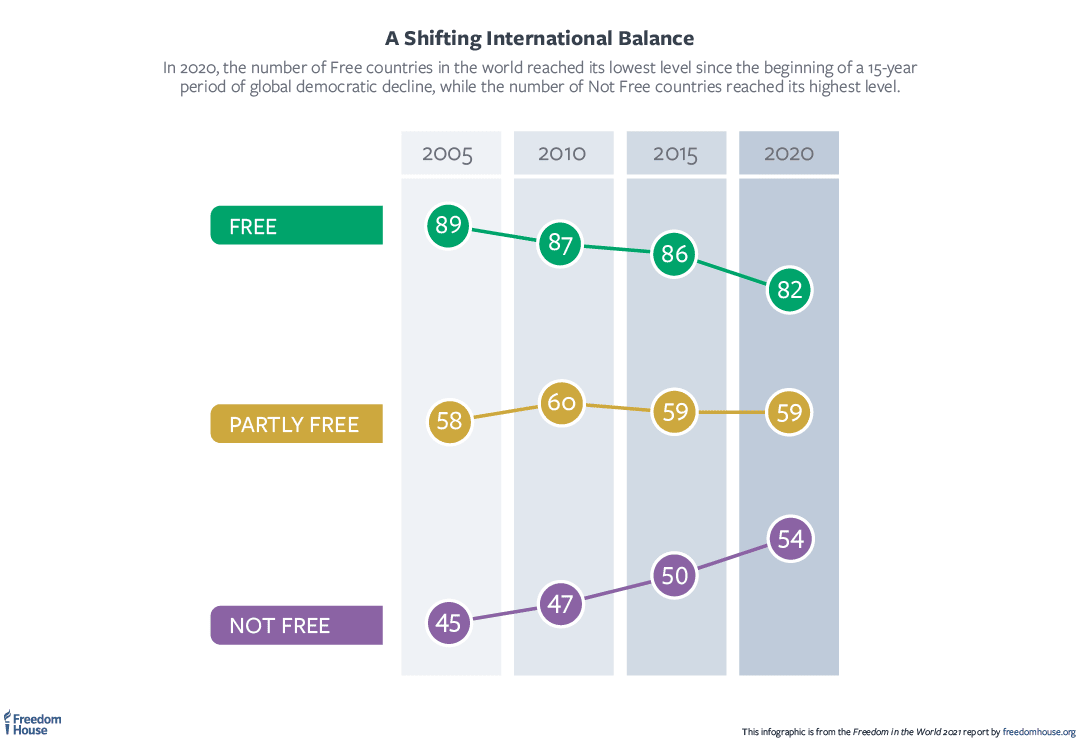
The Economist's Democracy Index shows a sharp decline over the last decade:
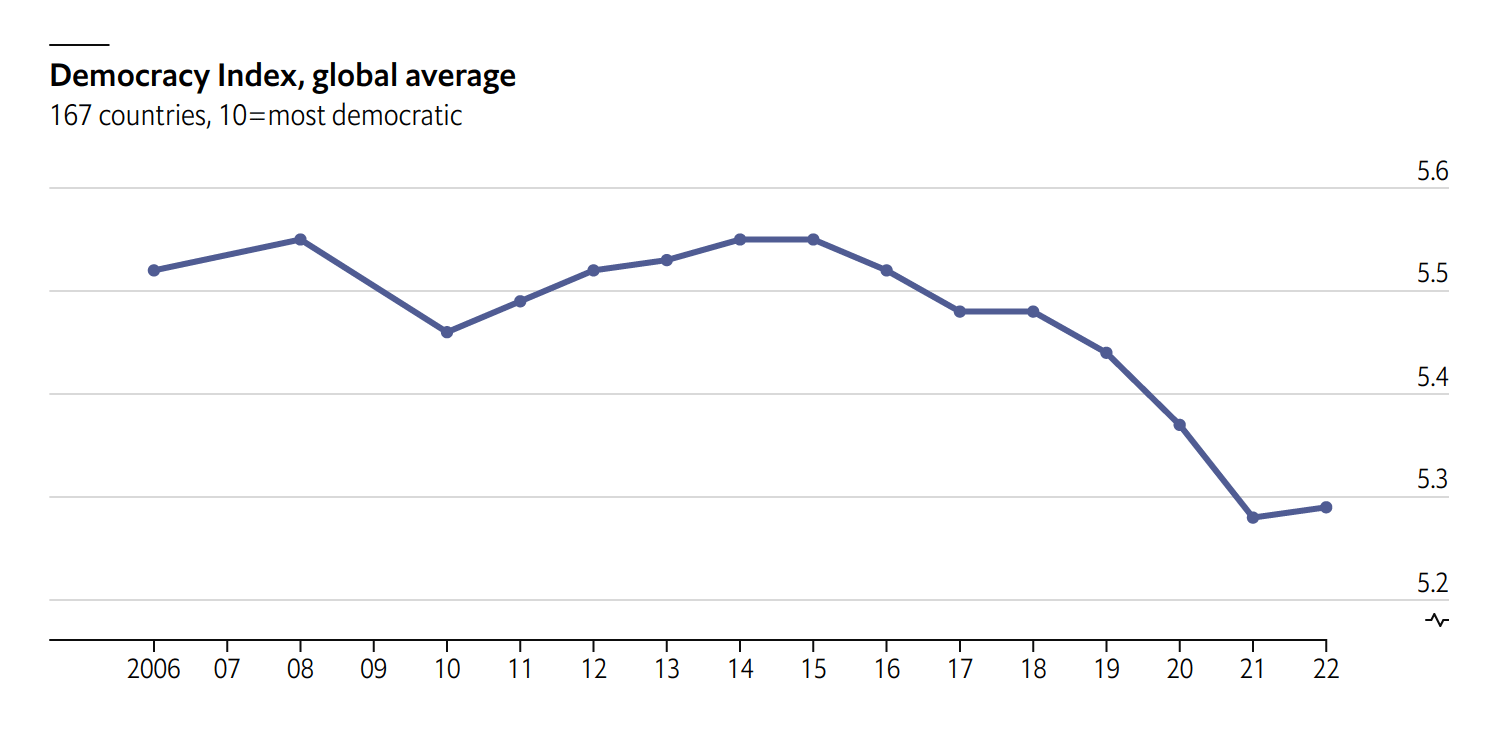
The V-Dem Institute's tracker shows that, after widespread growth in democracy during the 1980s and 90s, many more countries are now becoming autocratic than democratic, especially weighted by population:
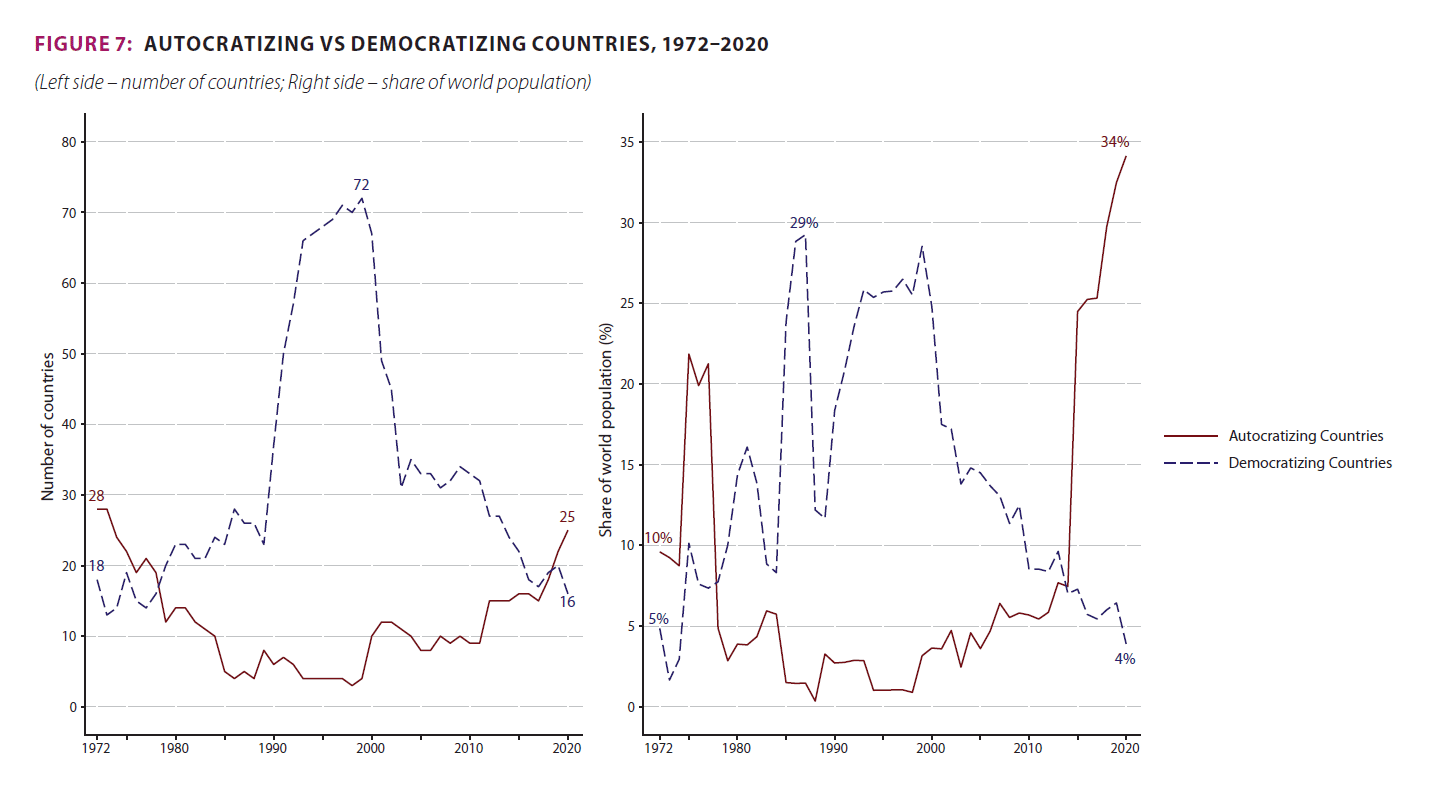
Very poor areas like Mali and Sudan are prone to military coups, but in more established countries, fascism is usually established through a process of democratic backsliding under a populist leader. Essentially, the steps are:
- A charismatic figure emerges to lead a new populist movement, focusing on opposition to the existing political system and its "elites".
- Eventually, average people become dissatisfied with the existing democratic government or leader. Possible reasons range from corruption, to scandals, to economic decline, to a hostile press. As of 2023, most leaders of developed countries have poor approval ratings; opinions vary on whether this is because of changes in the media landscape, or whether society overall just sucks more than it used to.
- In the next election, ordinary people vote for the new populist movement and its leader, and they win democratically.
- Once in power, the new leadership uses state institutions to slowly, one piece at a time, give themselves electoral advantages. They gerrymander districts, take over the media, punish any opposition, and purge or abolish outside institutions or checks on their authority (courts, electoral commissions, local governments, etc.), until democracy is gone.
In a typical post-war, Western democracy, there will be different parties and ideologies, but the leadership of all parties form an elite that shares certain cultural norms. (Scott, Bret Devereaux, and Eliezer all discuss this; Eliezer portrays it as a bad thing, although perhaps he has changed his mind since 2008.) In populist authoritarianism, this group is replaced with a new elite, detached from existing institutions, that lacks interest in ideas like human rights and the rule of law. Hitler is the big example that everyone is familiar with, but he might not be the best one, as Weimar Germany was a strange place and the Nazis were unusual in many ways. Recent, more typical examples that Scott Alexander has written about include Modi in India, Erdogan in Turkey, and Orban in Hungary.
There's nothing inherently partisan about this backsliding process, and past decades have seen various left-wing populist authoritarians, like Huey Long in the US or Hugo Chavez in Venezuela. However, current political trends strongly favor right-wing authoritarianism, national conservatism, or "cultural populism", which "claims that the true people are the native members of the nation-state, and outsiders can include immigrants, criminals, ethnic and religious minorities, and cosmopolitan elites. Cultural populism tends to emphasize religious traditionalism, law and order, sovereignty, and painting migrants as enemies" (from here). The number and strength of right-wing authoritarians now far outmatches left-wing ones.
The political extremism or bad behavior of populist leaders often shocks past politicians, the press, and civil society, and some assume they will be quickly voted out. However, political studies show that populists last much longer in office than traditional leaders do, and they rarely lose elections once in power:
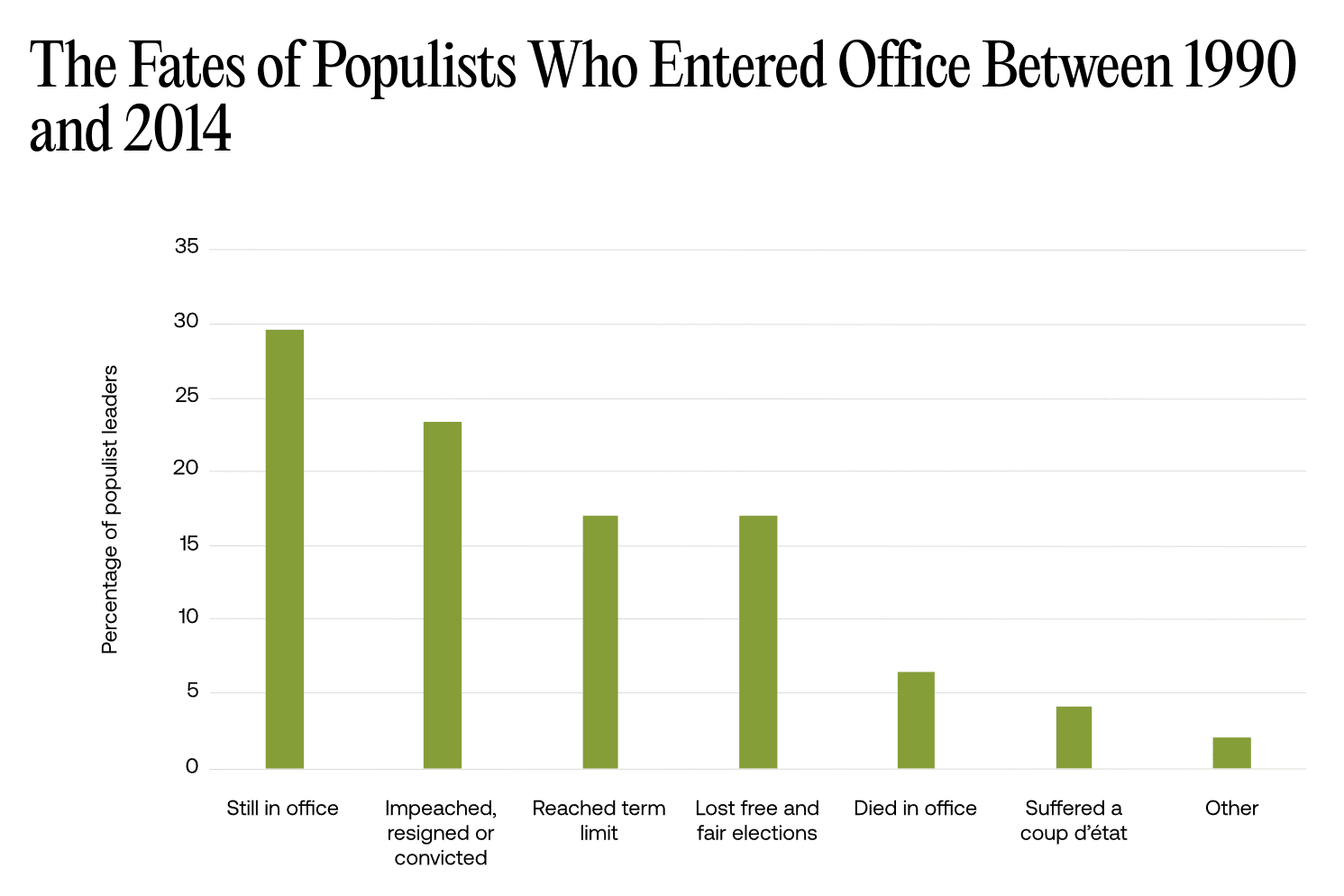
Most educated elites dislike dictators, and many assume that in democracies, being pro-dictator is a fringe minority view. But in most countries, a large minority or even a majority of voters see dictatorship ("a strong leader who does not have to bother with parliament and elections") as a good form of government. This makes it possible for many authoritarians to win democratically, especially if they are seen as "the lesser of two evils". Here is a map I made of public opinion on dictatorship, based on World Values Survey data:
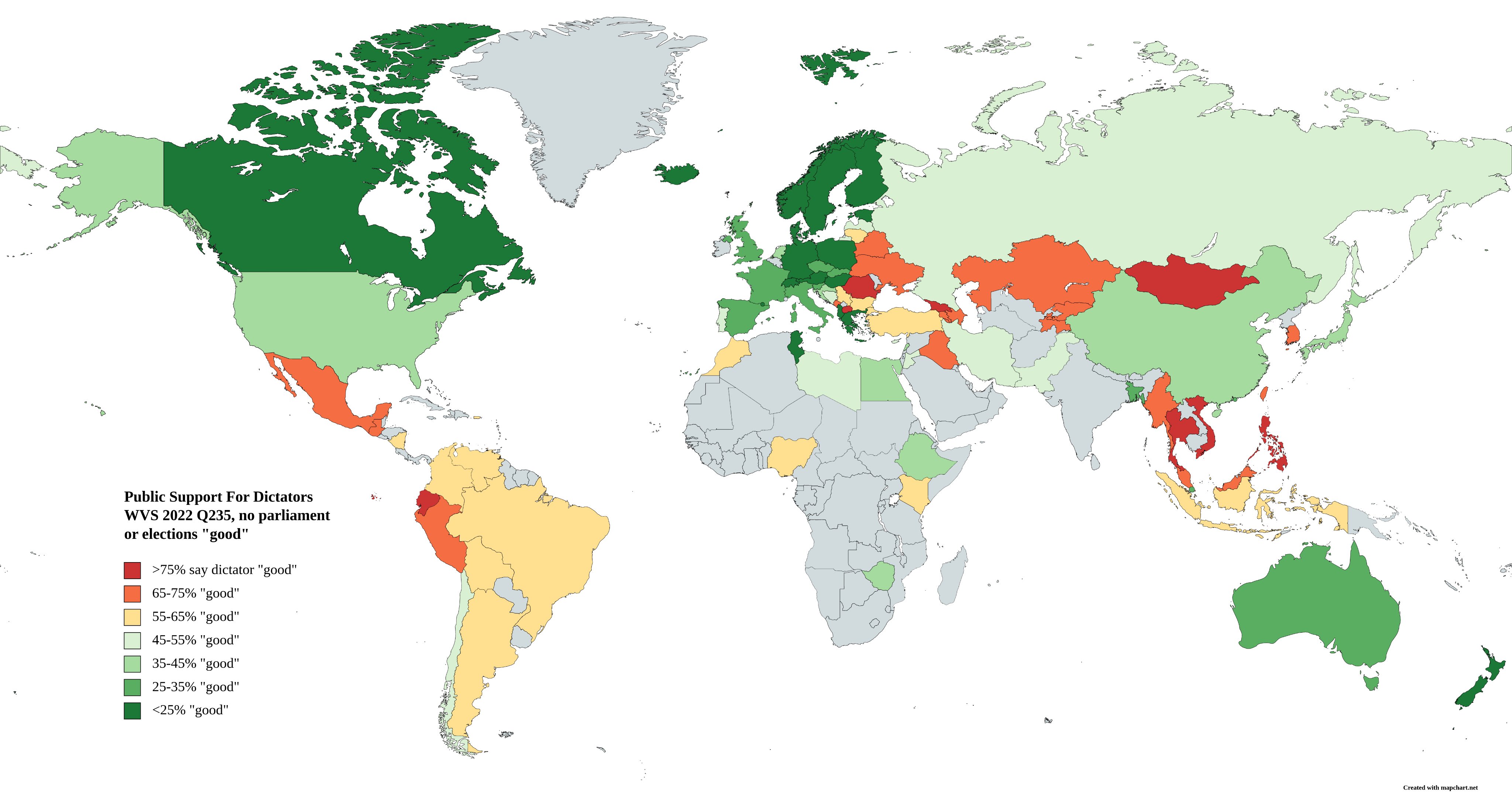
National Exceptionalism
I think many people acknowledge this overall trend, but since most of the newest fascist regimes have been small or poor, they still believe some countries are relatively safe. In essence, "fascism might happen in X, Y and Z, but that doesn't mean it will happen here; here is totally different than those other places. We're a true democracy, a solid democracy, and we don't wear those funny hats like the Xs and Ys do." However, most democracies now have large, extreme, and growing far-right movements, even those that were considered "immune" to fascism in the past. It used to be that all politics was local, but now that the Internet is widespread, political movements and messages can easily cross borders and be heard anywhere, globalizing trends. Educational polarization, the tendency for working-class voters to move en masse into right-wing nationalist parties while educated voters move left, is a common shift that has happened everywhere from Sweden to Brazil.
France, for example, is a very old, well-established and liberal democracy. It has had a far-right party (National Front/National Rally) since the 1970s, but voters of other parties came together in a "republican front", to keep them out of power and fight their extremism. However, this has broken down recently, with the far right becoming a large, growing, and mainstream party:
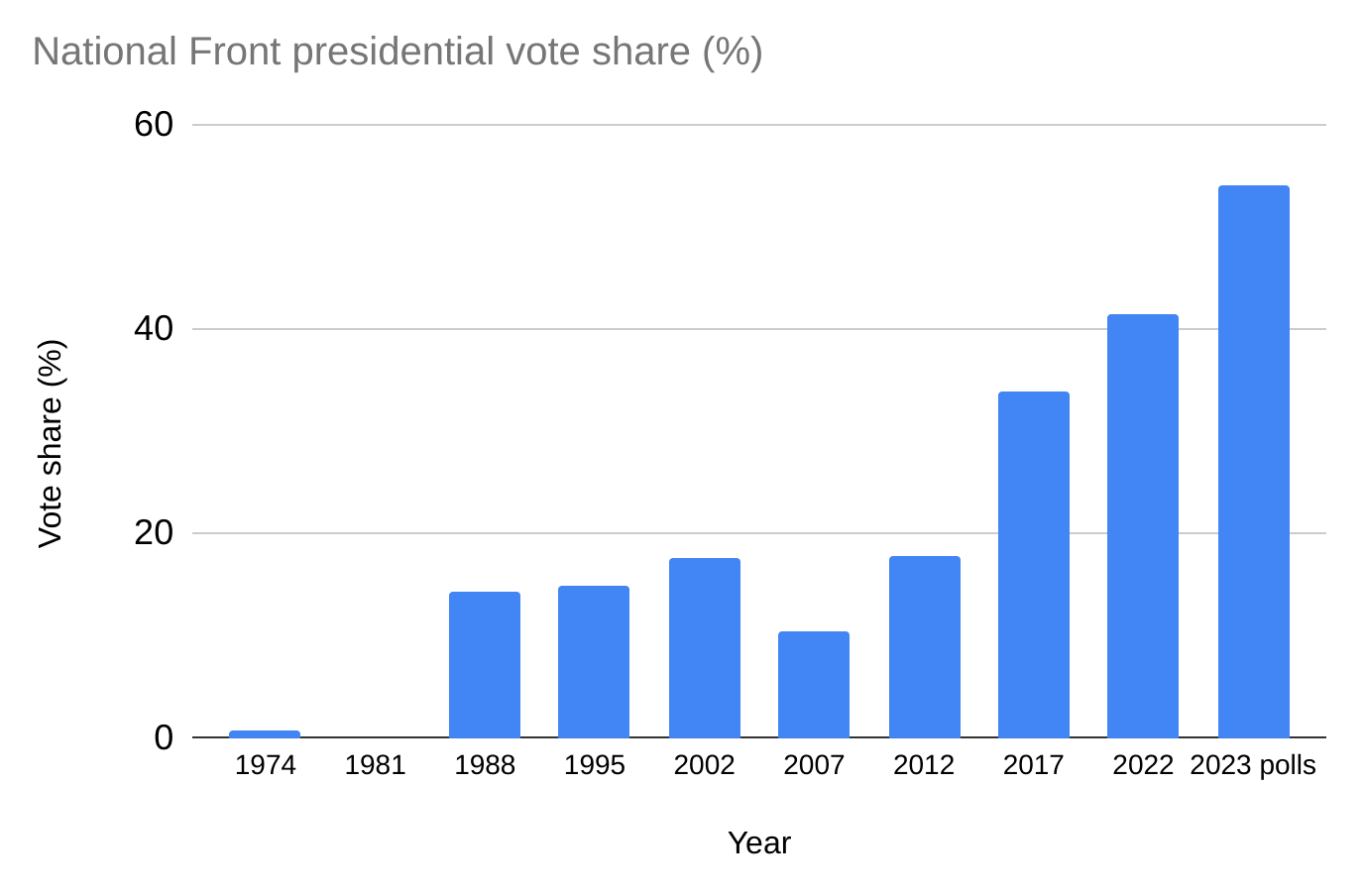
Laws might try to ban or limit fascist movements; but ultimately, any law or constitution is simply words on paper, institutions are made out of people, and guarantees of democracy mean nothing unless everyone with power believes in them. After WWII, for example, the new Italian constitution banned fascism and fascist parties. However, the old fascist party was quickly re-constituted as the "Italian Social Movement", under Giorgio Almirante, previously an official in Mussolini's government. Their successors, the Brothers of Italy, are now the largest party in Italy's legislature, under far-right Prime Minister Giorgia Meloni:
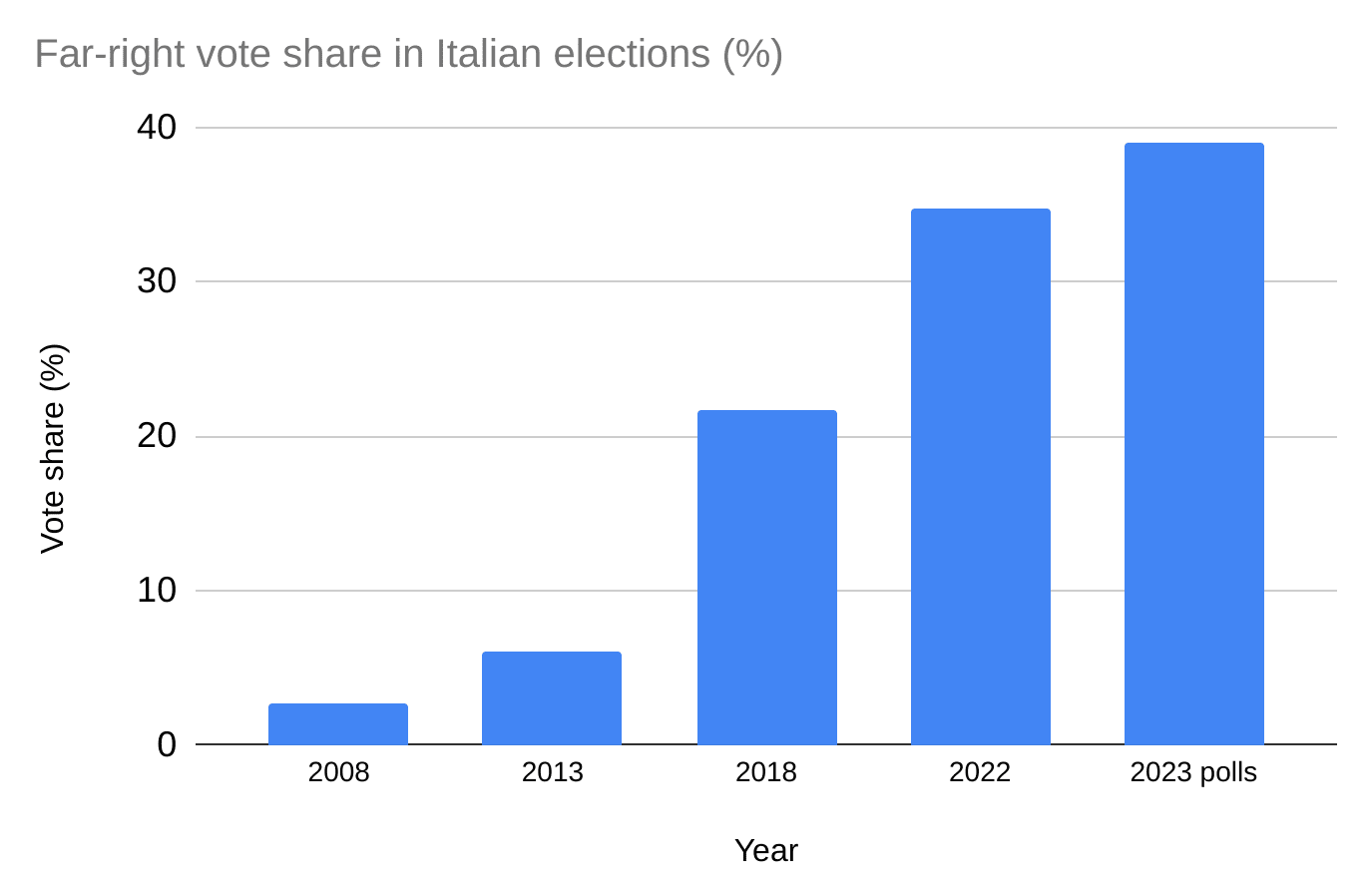
Likewise, the banned far-right Vlaams Blok in Belgium was quickly reconstituted as "Vlaams Belang". In Germany, the post-war government and constitution tried to create a "defensive democracy" that would resist fascism, and until recently, there was no large far-right party in parliament. However, the far-right AfD has now hit a record high in polls, making them the second-largest party in Germany, even though AfD is under surveillance as a right-wing extremist movement and a regional leader was just arrested for using Nazi slogans. For now, AfD is under a "cordon sanitaire", and cannot enter government because all other parties refuse cooperation with them; but such cordons have historically broken down as the far-right gets more vote share, as recently happened with eg. the far-right Sweden Democrats (more details here):
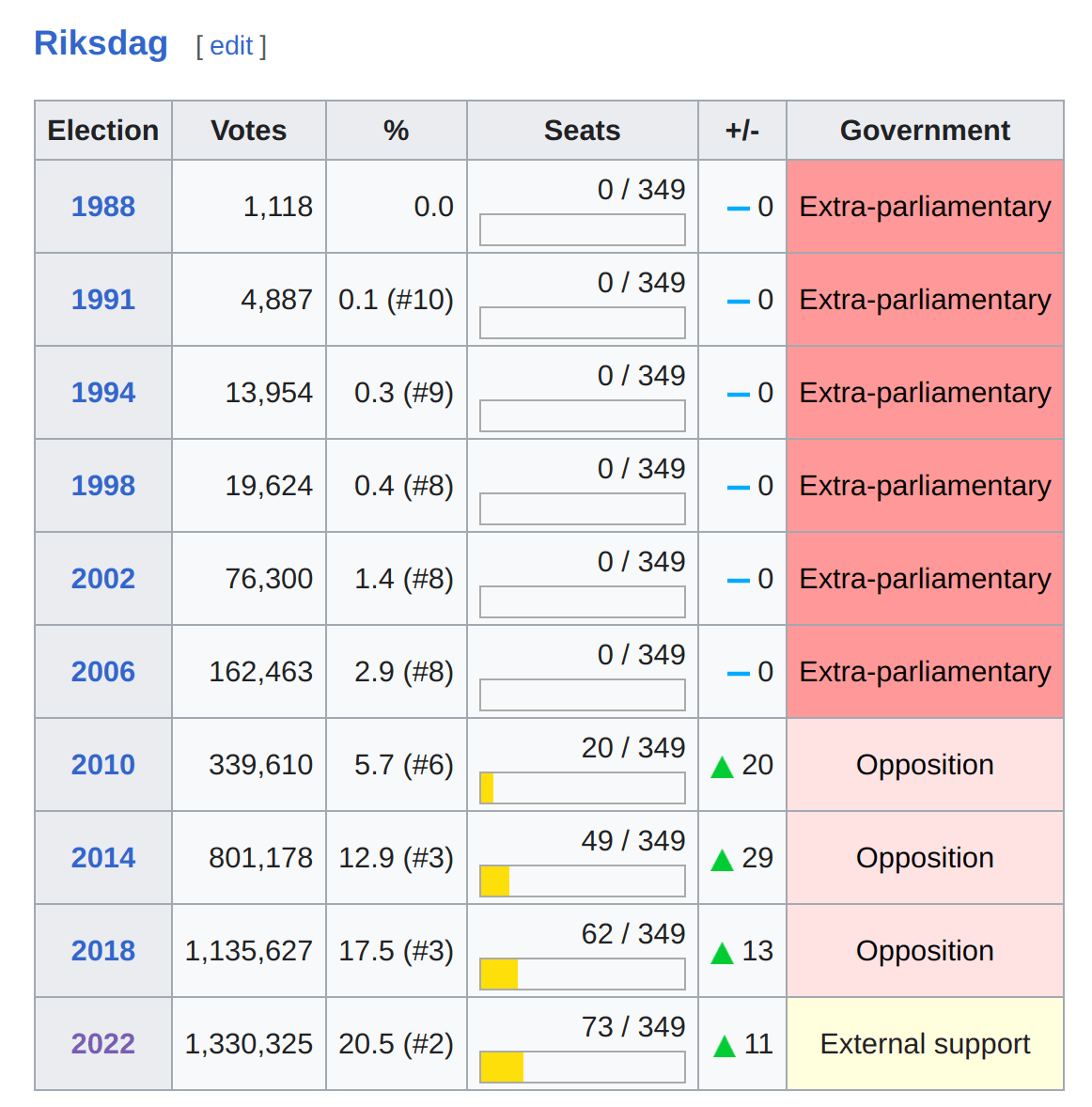
Even countries that, for a long time, were known for being "immune" to fascism have quickly changed course. This 2017 article, for example, discusses the reasons why Spain didn't have large far-right parties, but Vox emerged as an electoral force a year later, and it is likely to be part of the government after July's elections. Likewise, Portugal was thought to be "immune", but the far-right party Chega now polls at a record high. Chile was, for a long time, known for its stability and moderate politics, but in 2021 44% of voters supported fascist Jose Antonio Kast, the son of a Nazi emigre family that held power under Pinochet. All countries have differences, and each one will have a unique story, whether it's Gyurcsany's speech in Hungary or a mysterious plane crash in Poland. However, it's now clear that this is a global trend which affects everyone everywhere, and that national quirks won't keep fascists at the door.
Only In America
In the United States, Donald Trump's efforts to overthrow democracy have been very well-documented, so I won't belabor them. As many point out, it is true that Trump failed, and that many of the dire predictions for his first term didn't come to pass. But what is less well-known is that:
- because of Biden's unpopularity, if the election were held again tomorrow, Biden would most likely lose. Biden won the tipping-point state, Wisconsin, by only half a percent in 2020, and both polls and favorability ratings show he has lost popularity since then;
- the House, Senate, and Electoral College all have biased maps that will let Republicans win a governing trifecta, even with a minority of the popular vote;
- two-thirds of Republican congressmen voted to overturn the election immediately after January 6th, and most of Trump's primary opponents strongly support his actions, so even if Trump has a heart attack tomorrow, many in the party would still be hostile to democracy;
- there have been waves of Republican retirements in the House and Senate during 2018 and 2022, so that many of the Trump-skeptical congressmen in office during his first term have been replaced by far-right radicals and Trump loyalists;
- most of the "adults in the room" during Trump's first term were fired or resigned, and Trump plans to fill their roles with new staff, loyal to his own vision;
- if elected to a second term, Trump has said he will use "Schedule F" to purge the non-partisan professional civil service, law enforcement, and the American military, and replace them with Trumpists who won't resist attempts to end democracy;
- if re-elected, Trump plans to withdraw the US from NATO and end the post-WWII policy of an American "nuclear umbrella", which will likely trigger a Chinese invasion of a now-defenseless Taiwan; global nuclear proliferation; and general, worldwide instability not seen since 1945.
Hence, it is fairly likely that Republicans will regain power in 2024, and very likely that they will sometime over the next decade, with much worse consequences than in 2001 or 2017.
America's political problems are sometimes described as "polarization", between one group of right-wing Trump supporters and another group of "woke" progressives. I'm not really a fan of "woke" ideas, but in democracies, they are made much less dangerous by being a movement run by small numbers of highly educated elites, who may influence various institutions but lack a solid electoral base. This is easier to see in Europe's multi-party systems, where the furthest-right parties (the dark blues and some gray) far outnumber the furthest-left parties (the darker red) in EU elections:
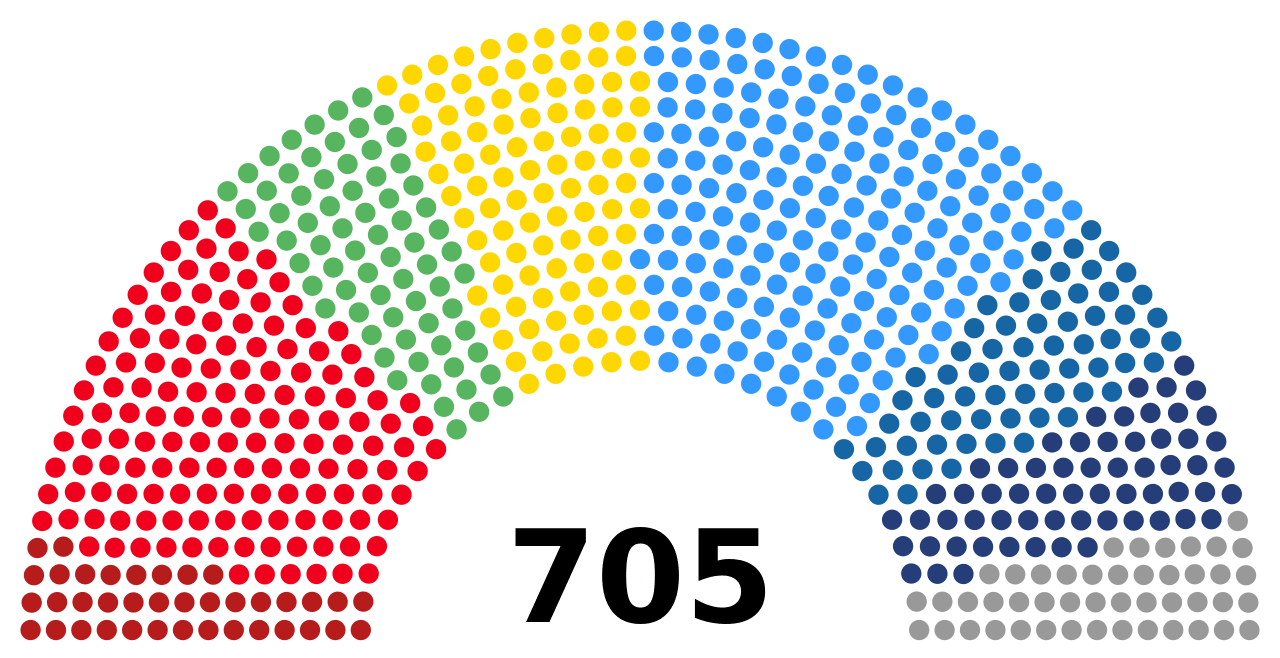
In the US, with just two parties, we have to make more guesses. However, the polling numbers we do have show that 24% of Americans would vote for Trumpist nationalism in a multi-party system, vs. only 8% who would vote for a "woke", left-wing AOC party. American conservatives far outnumber liberals, and "woke" policies like defunding the police and affirmative action are very unpopular even in left-wing areas, with the latter being defeated by huge margins in deep-blue California. Hence, even though there are both left-wing and right-wing radicals, it is vastly easier to imagine fascist dictatorship than a "woke" dictatorship, especially as the latter movement now seems to be in decline.
"Moderate" Fascism
In the West, the archetypal new dictator with a radical ideology is Hitler (with some also thinking of Stalin and Mao), so people often use those figures in historical analogies. Hitler, Stalin, and Mao were all unusually terrible even by radical dictator standards; it's worth remembering that most fascists aren't Hitler, don't want to gas the Jews, and aren't interested in starting catastrophic world wars. However, you can be an 'ordinary' dictator who is less bad than Hitler, and still be very very bad. Eg., here is some of what happened under Spain's Francisco Franco:
At the end of the Spanish Civil War the executions of the "enemies of the state" continued (some 50,000 people were killed), including the extrajudicial (death squad) executions of members of the Spanish maquis (anti–Francoist guerrillas) and their supporters (los enlaces, "the links"); in the province of Córdoba 220 maquis and 160 enlaces were killed. Thousands of men and women were imprisoned after the civil war in Francoist concentration camps, approximately 367,000 to 500,000 prisoners were held in 50 camps or prisons. In 1933, before the war, the prisons of Spain contained some 12,000 prisoners, just seven years later, in 1940, just one year after the end of the civil war, 280,000 prisoners were held in more than 500 prisons throughout the country. The principal purpose of the Francoist concentration camps was to classify the prisoners of war from the defeated Spanish Republic; men and women who were classified as "unrecoverable", were put to death.
Chile's Pinochet was very bad:
The most prevalent forms of state-sponsored torture that Chilean prisoners endured were electric shocks, waterboarding, beatings, and sexual abuse. Another common mechanism of torture employed was "disappearing" those who were deemed to be potentially subversive because they adhered to leftist political doctrines. The tactic of "disappearing" the enemies of the Pinochet regime was systematically carried out during the first four years of military rule. The "disappeared" were held in secret, subjected to torture and were often never seen again. Both the National Commission on Political Imprisonment and Torture (Valech Report) and the Commission of Truth and Reconciliation (Rettig Report) approximate that there were around 30,000 victims of human rights abuses in Chile, with 40,018 tortured and 2,279 executed.
More recently, Erdogan's Turkey has been very bad:
Some 160,000 people were detained for questioning, of which over 77,000 were formally arrested for alleged links to terror organizations, including Gulen’s network and outlawed Kurdish rebels. Those arrested include military personnel, police, journalists, lawmakers, judges and prosecutors.
According to Justice Ministry figures, close to 35,000 people put on trial for links to Gulen’s network have been convicted so far. Around 14,000 others were acquitted.
More than 130,000 people have been purged from the public service through emergency government decrees. Those dismissed include tens of thousands of teachers and close to 6,000 academics. Around 1,300 people were re-instated to jobs by a commission that was set up to review cases but 18,000 other appeals were rejected.
Other examples abound. Hence, simply "not being Hitler" does not imply that a dictatorship will be mild, or that most things will simply be "business as usual". Even if a regime is initially less extreme, many dictators will escalate their repression over time, as they solidify their power and remove liberals from high-ranking positions. This includes (eg.) communist China, which has always been authoritarian, but which has transitioned from "reform and opening up" to an intensely nationalist regime with heavy-handed repression, arbitrary seizure of businesses, and a genocide in Xinjiang.
What About AI?
After the release of GPT-4, some will see AI risk as both more dire (involving total human extinction) and more imminent than fascism risk. Honestly, that's very reasonable. However, even in a world with shorter timelines, I think fascism is still a relevant consideration:
- If we get a Jupiter Brain AI tomorrow, all bets are off the table, but few expect something that extreme. Sam Altman, the quintessential short-timeline accelerationist, is currently on an international tour meeting with heads of state, and is worried about the 2024 election. He wouldn't do that if he thought it would all be irrelevant next year.
- AI policy, strategy, and governance involves working with government officials within the political system. This will be very different if the relevant officials are fascists, who are selected for loyalty rather than competence.
- Right now, the core task an aligned AI needs to do is hard, but fairly straightforward and easy to explain: cooperate with existing states to stop anyone from building more powerful, unaligned AI (or superviruses, etc). Things look very different if the AI has to overthrow existing states, which is both significantly harder to do and much trickier to align. Most people, including most AI developers, will rightly be skeptical of a plan for "AI dictatorship" with no pre-existing legitimacy.
- A fascist government will likely interfere with AI development itself, in the same way that the COVID pandemic was a non-AI issue that nonetheless affected AI engineers. This has already been seen in eg. China's crackdown on the tech industry.
Prediction Market
(ADDED) Since posting this, Chris Billington has created a Manifold prediction market on how likely this is. I agree with this as a statement of my views, and have bet "yes".
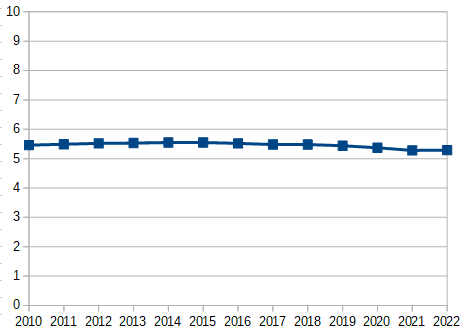
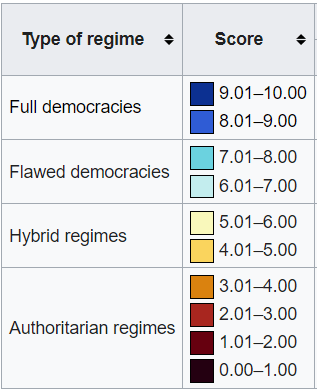
Thanks for the response! Here are some comments:
- India, Turkey, and Hungary are widely referred to as "hybrid regimes" (https://en.wikipedia.org/wiki/Hybrid_regime), in which opposition still exists and there are still elections, but the state interferes with elections so as to virtually guarantee victory. In Turkey's case, there have been many elections, but Erdogan always wins through a combination of mass arrests, media censorship, and sending his most popular opponent to prison for "insulting public officials" (https://www.bbc.com/news/world-europe-63977555). In India's case, Modi is no doubt very popular, but elections are likewise hardly fair when the main opponent is disqualified and sent to prison for "defamation" (insulting Modi). Rather than being voted out, hybrid regimes usually transition to full dictatorships, as has happened in (eg.) Russia, Belarus, Venezuela, Nicaragua, Iran, etc.
- Of course nothing is certain, but France's president is very powerful, and this article discusses in detail how Le Pen could manipulate the system to get a legislative supermajority and virtually unlimited power if elected: https://foreignpolicy.com/2022/04/20/france-election-le-pen-macron-constitution-separtism-law-state-of-emergency-referendum/
- I made a map here of roughly how much electoral support the far right has in each country worldwide (https://twitter.com/alyssamvance/status/1656882958903418880). However, it is tricky to forecast based on this, because far-right parties can appear from nothing and gain a wide support base very quickly (as happened with eg. Chile's Republican Party).